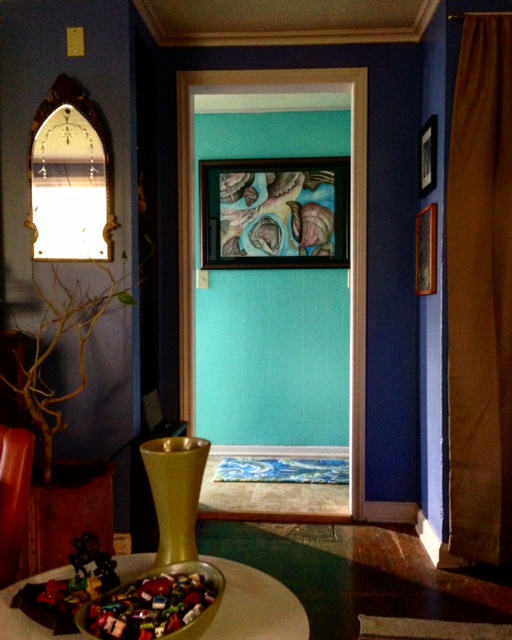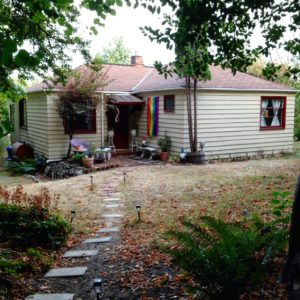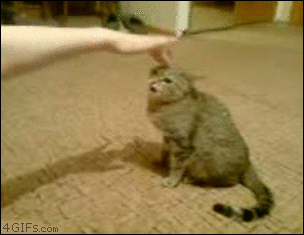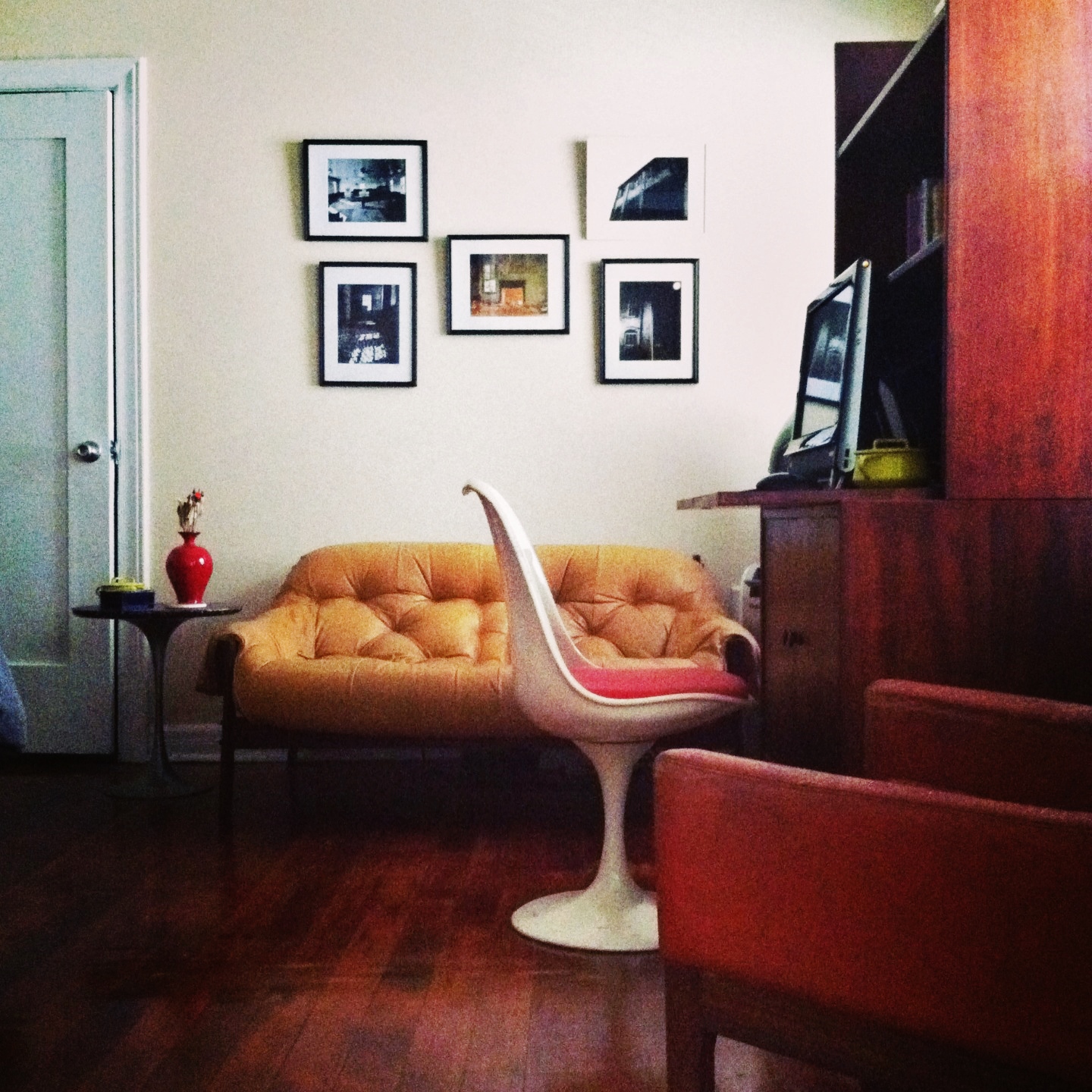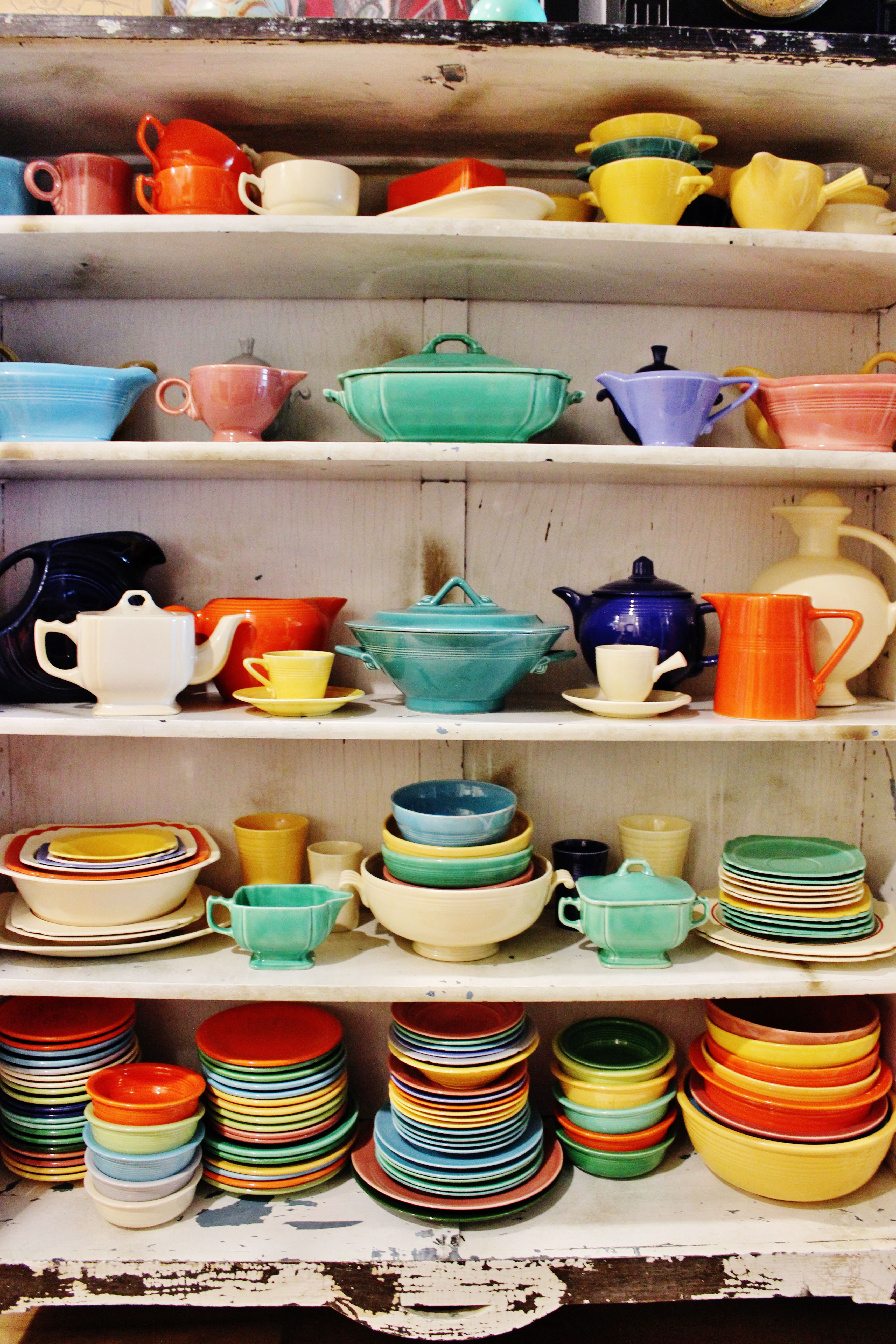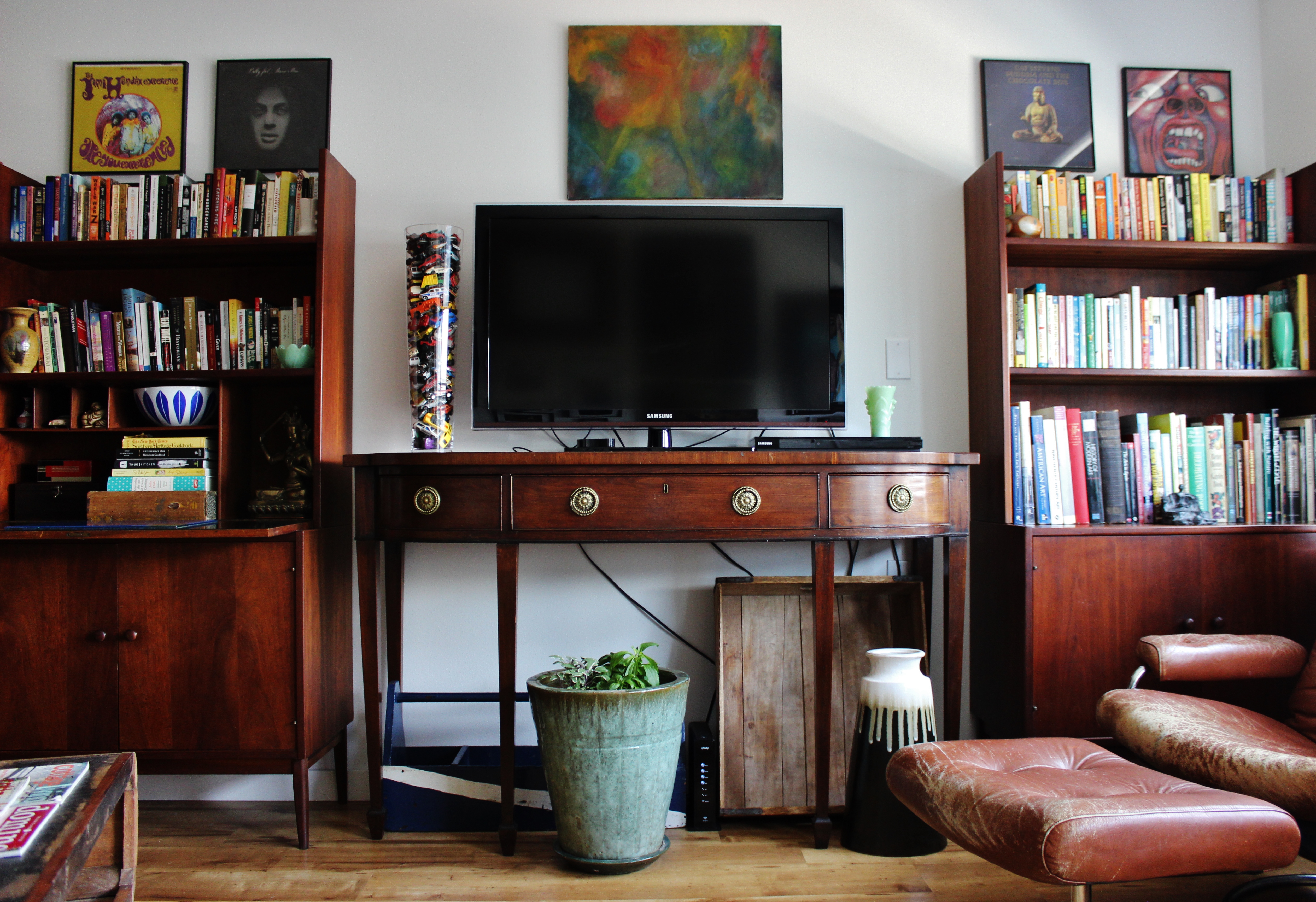Leaning against the front door and eyeing the cabinet’s dusty outline on the chipped, white-painted floor, I felt an unexpected weight lift; my mind was slightly clearer. Outside, rain drizzled down, and I hoped the man had made it down the hillside and back to the bridge without too much trouble.
I thought about the glass-fronted Art Deco cabinet in the back of his homemade hauling trailer—draped in a burlap shroud, like the recently deceased in a western: being slowly removed from home, taken far, far away. I recalled staring at myself in the glass door’s reflection the night I’d planned to kill myself a decade earlier.
We map so much emotional weight onto things.
I reached inside my jacket pocket and removed the crumpled bills, counting them out before folding them into the growing roll hidden inside a tin in my bedroom. Little by little, as pieces I’d cherished for well over a decade left me, I quieted my exhausted, fretting mind by reminding myself that I was doing this for all the right reasons: to work towards financial solvency, and improved health. And to experience a long-overdue catharsis.
The next day, I watched the sun slowly rise, bleeding through the opaque glass sliding doors separating the bedroom from the rest of my new apartment. The light warming my arms, the rumpled sheets washing wave-like over me.
I slipped into a favorite pair of worn jeans, threw on a holy tee shirt, and took JoJo out to welcome a new morning: the first day of a new beginning.
***
Before I reached the summit, I paused and looked out over the mossy canopy—a primeval, forested canvas. Rain dripped down from the tightly knitted fronds and branches, dappling my camera and sleeves with refreshing moisture. As I shifted my backpack and headed uphill, my bear bell clanged lowly—a metronomic reminder of my vulnerable place in the natural order.
A few feet later, I peered over the falls, absorbed the soothing sounds of fresh water flowing over weathered rocks—churning pools disappearing underground and re-surging downslope. I took a few deep breaths, exhaled, and soaked in the view, expecting to feel a crushing weight lifted off my shoulders.
But I felt nothing, except a needling question creeping into the back of my mind.
What in the fuck am I doing here?
Somewhere along the line, I’d convinced myself that I had to travel far stretches, overcome amazing feats, cross the country or the world to be rewarded with life-changing clarity. But my short foray into the Olympic Peninsula’s woods only reaffirmed what I already knew—what I recognized each evening as I slowly drifted off into a fitful night’s sleep in my tent with a writing pad, bear bell, knife, and canteen within arm’s reach, the solar-powered lantern hanging overhead: we need so very little to thrive.
We surround ourselves with so much superfluous stuff to blunt the simple reality that the more we have, the less we actually live.
***
The apartment was blissfully still—overburdened fans and the sound machine retired for a brief reprieve. Sunlight warmed the worn leather on the love seat, and dripped over the heat-racked, withering tendrils listing out of chipped terra cotta pots. Seattle was experiencing a protracted, more intense summer than usual—and prized plants that weathered Gay Gardens’ drafty chill had succumbed to the inescapable, stagnate heat.
JoJo braced herself against the gracile legs of the Art Deco buffet turned TV stand, and leered into the beating sun—her tongue gradually inching out as she lapsed into deeper sleep. I, too, felt the heat climbing—sweat beading across my brow, dripping down my nose.
I’d just hit the six month mark on my apartment lease, and it felt as though I’d been living here for ages. Albeit a glorified studio with few furnishings, there were chairs I never sat in, things I didn’t use—so much space allocated to stylized tableaus that were wholly unnecessary. Everywhere I looked, charmless sterility stared back—no uneven angles, no roughened edges, just cool, muted cream walls and dark grey carpeting, particle board cabinets, and an overly massive bathroom. I began to regard it as a charmless easy bake oven in which I felt suffocatingly uninspired.
Weeks later, just before midnight, I scanned the room—soft light from the only remaining lamp illuminating a smattering of plants, cascading over a haphazard assortment of empty pots and stickered surfaces. I hugged the brownie-packed Cathrineholm casserole to my chest with one hand, and used the other to wield my fork—shoving it into the cakey middle and boring out a hole. As Ghost’s end credits rolled, “Unchained Melody” reverberated throughout the apartment. I felt like crying out of sheer exhaustion, but I didn’t want to saturate my brownies. JoJo rustled in her crate and let out an exasperated sigh; I was up far too late and making a ruckus. I tucked the DVD back into its case and slid it into the “Keep” pile.
Hours before, from the overstocked Fiction section, I watched the bookshop’s buyer assess my bags of DVDs and books. As he thumbed through the thick, leather-bound art book I’d toted around for years—but rarely opened—he called back to his partner, “Yeah, we’ll make an offer on this lot.”
I circled back through the shop to give them time, and sidestepped into the Social Sciences section for amusement. A few of my previously sold books—including one of the referential cruxes of my anthropology Master’s thesis—sat on the shelf gathering dust. I flipped through it, chuckled at my margin notes and dogears, and slid it back into the uneven line of bindings; the symbolism was laughable. Shortly thereafter, I found myself back at the counter.
All told, my haul garnered $16.25.
I sighed dejectedly. “Sold.”
The clerk who’d reviewed my pile sidled up to me.
“Hey, you know, it’s a bummer. But take a look at that back wall.”
He pointed behind the counter to a far wall partly obscured by mounded boxes of DVDs.
“I think I’m going to have to start pricing their resale at five cents apiece. But hey, this book, it’s so weird.”
He touched the large volume with unexpected gentleness. “I have no idea what it is, but it’s going to look great on someone’s bookshelf.”
I laughed.
“But at least it’ll stay in circulation. We’ll keep its story going.”
I smiled, patted the pile, collected my receipt, and walked away.
***
Days later, JoJo struggled against my snug hold. She was more interested in our coiffed visitor than being sandwiched against my sweat-saturated shirt. I couldn’t blame her.
The woman rapped her bejeweled press-on nails across the weathered dining table as she surveyed a pile of studio art pottery, and lifted up small mid century cache pots pocked with struggling succulents. She extended her index finger, the polished nail tip squaring dead-center on the glazed pot behind me—one that friends from North Carolina had gifted me right before I moved to Raleigh. Out from it grew a large Pilea peperomioides—what I’d come to dub as one of many “hipster plant necessities.”
“How much?”
I’d already told her that I hadn’t yet priced many items in the apartment, that I hadn’t anticipated having any buyers over. Still, I tried to reframe the whole situation as an opportunity.
I quoted a price, and then she motioned toward a small cluster of pots lining a corner table.
“And those four?”
As if sensing my growing irritation, JoJo sighed in my arms and descended into full-on fainting goat, her tiny form sagging as she exercised her greatest anti-holding technique: dead weight.
“All together, forty-five,” I blurted, setting JoJo down.
The minute the “five” rolled off my tongue, I cringed. Albeit a painfully low price, the plants needed to go.
Exceedingly pleased, the woman began doling her cash onto the table. Seconds later, she upended her purse entirely, counting quarters into one-dollar piles as her bangled bracelets clattered together in metallic applause.
JoJo sniffed around the woman’s pristine suit pant cuffs, and I snapped at her to back off. She glared back, wandered over to the spot vacated by the large planter I’d dragged over to the woman’s pile, and proceeded to roll around in the sun.
Touche.
“I have thirty-one dollars,” the woman said confidently, adding, “This is my laundry money.” As if that somehow justified the low-ball counteroffer.
I sighed.
“Fine.”
“So, you do this for a living?” she asked, apparently forgetting she’d already posed the same question thirty minutes prior, as I helped her load six large plants into her oversized, battered Ford pickup.
“Nope. But I’ve thought about it.”
“You really should. You have a lot of nice things.”
That line gets me every single time. It’s a kind sentiment to express, and it’s certainly a prospect I’ve explored. But I remind myself about how stressed I get when I’m surrounded by those same “nice things”—and the associated, incessant drive to collect more and then immediately shed the bulk. It’s bulimic materialism, one of the waste behaviors we’re taught is normal. Because, from an early age, people in America are conditioned to believe that the Norman Rockwell-esque “American Dream” is the pinnacle of success: two kids, a spouse, a generously-sized house with a new car parked in the driveway, and Scraps the dog running through a perfectly manicured green lawn out front. But that same dream has always been rooted in white supremacy and white privilege, racist policies, and a tarted up version of Manifest Destiny—move to the West and take what is rightfully yours; a hallmark of this country’s deep-seated taproot springing from genocide and slavery. This problematic mirage is perpetuated through hyperconsumerism, capitalism’s key driver: the notion that, with “hard won success” and a “can-do attitude,” comes the ability—nay, necessity—to conspicuously consume the right house, car, wardrobe, and on-trend decor. And we all fall for it; I certainly did.
Only after I finally got out of debt, and through ample self-reflection, was I able to acknowledge that I don’t want or need most of the elements of that force-fed image of success. More than ever, I now crave physical and mental space to breathe—to be free of things. I intend to wholeheartedly embrace this mentality while I’m young, rather than burying myself in baubles or committing myself to an unhealthy, toxic relationship in the short term, and then spending my precious golden years fretting about how to escape. So much of this next chapter is unwritten. But those parts I’m beginning to author are all about self care, and putting boundaries in place. Of cherishing what little I need, and letting the rest go—keeping only that which helps catapult me into my next phase. No matter where I end up, I’ll continue to map on my sense of personal beauty through the experiences and company I keep.
I slammed the truck’s heavy tailgate, and nodded to the woman. After I crossed the road back to my complex, she drove by slowly and rolled down her window.
“And let me know when you, uh, leave for good. What you want to do with the rest of your items. I have sort of a buying problem. HAHA!”
I waved her on, and assured her that I would. But I knew I’d never see her again.
***
As a high school senior, I was assigned a 10-page paper—a dreaded semester-long project, the tales of which resonated through my predecessors’ ranks. It’d be a literary rite of passage, a hurdle to clear. Each student chose a word, and that was the singular focus of their paper—its etymology, symbolism, and its evolving usages throughout history and through the works we’d read. It required calculated introspection.
I chose “growth.”
Decades later, I find myself in a far-flung corner of the country, away from everything and everyone I know. Moving here was a decision made as part of a joint life being cultivated; two years ago, it became a solo journey. I stayed and forced myself to root, to grow into my surroundings. I rehabbed Gay Gardens; I lost myself there. It became my Eden, from which I begrudgingly acknowledged I needed to fall. And I did.
I evolved, adapted.
Whenever I think of growth—as I did all of those years ago—the most common reflection is something new, generative: intimating some greater experience—a building of momentum, toward a logical conclusion or form. But the personal growth I’ve experienced here has been antithetical to how I assumed my life would develop: that it’d grow in a defined, understood direction. That’s not the case.
My anticipated “beginning” in Seattle is no longer dependent on when I find someone, or the “right” job, or encounter some fortuitous windfall, or even accomplish long-held dreams. It’s suddenly so painfully obvious, and within my ability to kick-start. I just have to lean into it, allow myself to grow into this new mindset, and stop pretending as though I know what my life is supposed to be like. Because none of us knows. We’re all pretending like we do, but we’re really just here for the ride.
We’re all growing into journeys we never thought we’d take. And that’s the messy beauty of it all.

